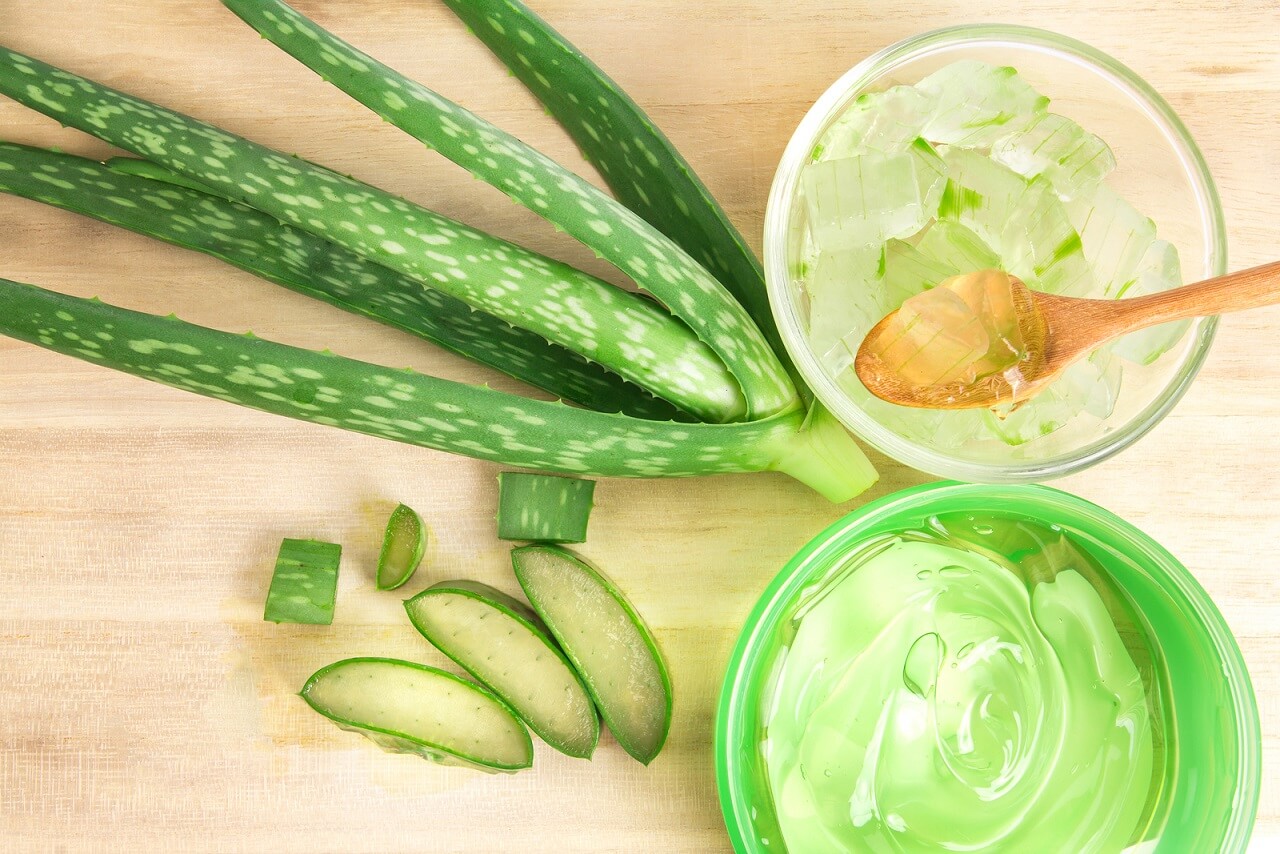
النباتات والأعشاب الأيورفيدية ذات الفوائد الصحية
تلعب النباتات والأعشاب الأيورفيدية دورًا رئيسيًا في ممارسة الطب الأيورفيدي. يُعتقد أن أمراض الإنسان ناجمة عن ضعف في الجسم يُمكّنه من السيطرة على المرض. يستخدم الأيورفيدا النباتات والأعشاب الطبية لتطهير الجسم، وتعزيز مناعته ضد الأمراض، ودعم وظائفه الطبيعية لدرء الأمراض. يقوم المبدأ الأساسي للطب الأيورفيدي على علاج الجسم ككل بدلاً من الاستجابة لأعراض المرض. تساعد النباتات والأعشاب الأيورفيدية الجسم على الشفاء بشكل طبيعي من الداخل. نادرًا ما تُستخدم هذه النباتات أو الأعشاب الطبية بمفردها، بل تُستخدم كجزء من طرق علاجية مختلفة في الأيورفيدا، مثل التغذية والتدليك والعلاج بالروائح العطرية وغيرها.
الصبار، النبتة السحرية (ألو باربادنسيس ميلر):
الصبار نبات معروف عالميًا، ويُزرع على نطاق واسع في الهند. هناك آلاف المصانع الطبية حول العالم التي تستخدم الصبار، بما في ذلك صناعات التجميل. يُعد الصبار المكون الرئيسي لأدوية نمو الشعر، إذ يُمكنه التحكم في الصلع وتساقط الشعر والقضاء عليهما. وقد اتسع مفهوم الجمال لدى النساء حول العالم بفضل الاستخدام المتعدد الجوانب للألوفيرا. يتميز هذا النبات الأخضر الشائك بقدرته العلاجية الهائلة، ويُمكن الاعتماد عليه في مكافحة العديد من الأمراض. ولعل أمريكا هي البلد الذي يتألق فيه الصبار، ذلك النبات الطبي، في جميع جوانبه.
عصير الصبار مميز للغاية، واستخدامه المنتظم مفيد جدًا للجميع.
يُوصي الأيورفيدا باستخدام الصبار لعلاج العديد من الأمراض. في علم الأيورفيدا، يحظى الصبار أيضًا بمكانة بارزة في العلوم الطبية، لأنه يوفر الاسترخاء والشفاء للمشاكل الصحية.
تناول الأيورفيدا (أزاديراشتا إنديكا):
النيم شجرة شائعة في جميع أنحاء الهند. ومع ذلك، تُعدّ ولايات جنوب الهند، مثل تاميل نادو وكيرالا، من الولايات التي تُوفر النيم بكثرة. لا تحتاج شجرة النيم إلى الكثير من الماء للبقاء على قيد الحياة، فهي تنمو دون الحاجة إلى الماء. تحتاج معابد جنوب الهند إلى كميات كبيرة من النيم سنويًا. كما تحتاج معابد عمّان في تاميل نادو وكيرالا إلى أوراق النيم بكميات كبيرة. لولا أوراق النيم، لما كانت هناك طقوس دينية في معابد عمّان. يُعدّ النيم جزءًا مهمًا من الطقوس الدينية في معابد عمّان جنوب الهند. يُعتبر النيم شجرةً إلهية، وله قدرة على شفاء العديد من الأمراض. النيم هو أفضل مضاد حيوي، وله قدرة مذهلة على شفاء العديد من أمراض الجلد. النيم شجرة متعددة الاستخدامات. في الأيورفيدا وحدها، تُستخدم شجرة النيم وأوراقها لمئات الأنواع. إن القدرة العلاجية للنيم مذهلة. إنه علاج لمرضى السكري والعديد من أمراض الجلد. ويُصنّع قسم الأمراض الجلدية، المختص بعلاج أمراض الجلد، أدويةً فعالةً جدًا من النيم. ولا يزال النيم شجرةً رائعةً للعلماء. كما أن ريح النيم المستنشقة منه فعالةٌ جدًا في مكافحة بعض الأمراض.
تولاسي، النبات المذهل (Ocimum Tenuiflorum):
تولاسي أو تولاسي نبات ذو قوة طبية هائلة. في الديانة الهندوسية، يحظى تولاسي بأهمية كبيرة. تولاسي نبات مقدس في المنظور الديني الهندوسي. لديه كل ما يلزم لشفاء العديد من الأمراض. في الأيورفيدا، يلعب نبات تولاسي دورًا مهمًا. يُعد نبات تولاسي جزءًا من بعض الطقوس الهندوسية. يُستخدم إكليل تولاسي لعبادة الإله كريشنا. في الهندوس
في الأساطير، يُعدّ التولاسي عاملاً ضروريًا. يُعتقد أن التولاسي هو المظهر الأرضي للإله. إنه مضاد حيوي قوي جدًا وفعال كدواء خاصةً للحمى ونزلات البرد، كما أنه يعمل ضد البعوض. كما أنه يمنح قوة مناعية. كان يُزرع التولاسي أمام المنازل الهندوسية. تُستخدم بعض الهياكل الحجرية أيضًا لزراعة وحماية التولاسي، وهو نبات مميز. يُولي الدين الهندوسي أولوية كبيرة للتولاسي، ويتمثل الدور المهم للتولاسي في الطقوس الدينية وكذلك للأغراض الطبية. من الممكن صنع زيت عطري من التولاسي. يُقدم الآلهة الهندوسية فيشنو وكريشنا وفيثوبا عبادات مثمرة مع التولاسي. إنه نبات أو عشبة فريدة جدًا وتنشر رائحة صحية. يحتوي التولاسي على الذهب في عصيره وهي حقيقة مثبتة علميًا.
نبات البرسيم رباعي الأوراق (Phyllanthus Emblica):
الأملا، أو "عنب الثعلب الهندي"، شجرة تنمو في الهند والشرق الأوسط. يتراوح حجمها بين صغير ومتوسط، ويصل ارتفاعها إلى 8 و18 مترًا، بجذع معوج وأغصان ممتدة. الأغصان صغيرة أو مشعرة، بطول 10-20 سم، وعادةً ما تكون متساقطة. أوراقها خضراء فاتحة، تشبه أوراق الريش، متجمعة على طول الأغصان، وأزهارها صفراء مخضرة. تُعرف الأملا أيضًا باسم أمريتفالا في اللغة السنسكريتية، والتي تعني حرفيًا "ثمرة الجنة" أو "ثمرة الرحيق". سُميت بهذا الاسم لغناها بالعديد من الخصائص المرغوبة. الثمرة شبه كروية، صفراء مخضرة فاتحة، ناعمة الملمس، صلبة الملمس، بستة خطوط عمودية أو أخاديد. تُقدّر هذه الفاكهة بشدة لاحتوائها على نسبة عالية من فيتامين سي، وللزيت الثمين المُستخرج من بذورها. معجون الفاكهة هو مكون رئيسي في تشافيانبراش، وهو منشط أيورفيدي شائع، ويُستخدم لبها كعلاج لمشاكل الشعر وفروة الرأس. ومن الاستخدامات الشائعة لهذه الفاكهة الأدوية والمقويات نظرًا لغناها بفيتامين سي. في الواقع، وثّقت الدراسات أن ثمرة الأملا، بالكيلوغرام، هي أغنى مصدر لفيتامين سي في العالم.
براهمي (باكوبا مونيري):
البراهمي عشبة فريدة تُعتبر مُحسّنة للذاكرة. إنها عشبة صغيرة عصارية ذات فروع عديدة، متجذّرة عند العقد، وتوجد عادةً على ارتفاعات تصل إلى حوالي 4400 قدم فوق مستوى سطح البحر. تنمو في المناطق المستنقعية والمياه الضحلة والأراضي الرطبة. أزهارها بيضاء أو أرجوانية فاتحة اللون، ذات أربع أو خمس بتلات، وتُستخدم لأغراض طبية. يتميز هذا النبات بخاصية تبريد تُساعد على تنشيط الدماغ، حيث يُساعد على الحفاظ على هدوء العقل وتركيزه، كما يُساعد على الحصول على نوم هانئ. يُساعد البراهمي على تحسين وظائف الدماغ، وهو ممتاز في تقوية الذاكرة. يُساعد وجود الباكوسيد في مُكافحة مرض الزهايمر، إذ يُمكن أن يُساعد في إعادة بناء أنسجة الدماغ. كما أنه غني بمضادات الأكسدة التي تُساعد على عيش حياة صحية. يُمكن أن يُساعد تناول البراهمي بانتظام في تقوية جهاز المناعة.
لطالما كانت النباتات والأعشاب الأيورفيدية جزءًا أساسيًا من الطب الأيورفيدي التقليدي لقرون. كما تدعم الدراسات العلمية الحديثة الفوائد الصحية التي تُقدمها، والتي تشمل الوقاية من أمراض القلب وداء السكري من النوع الثاني. لذا، فإن إدراج كميات صغيرة من هذه الأعشاب والنباتات الطبية في نظامك الغذائي اليومي يُعزز مناعتك وصحتك. ولأن الأيورفيدا تتبع نهجًا شموليًا للصحة، فمن المهم أيضًا الحصول على قسط كافٍ من النوم وممارسة الأنشطة البدنية وتحسين إدارة التوتر. كما أن تضمين أنواع مختلفة من الفواكه والخضراوات في نظامك الغذائي يُساعد أيضًا في الحفاظ على توازن صحتك.












